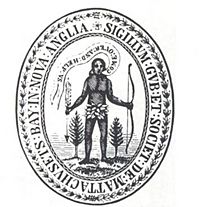Massachusetts Body of Liberties facts for kids
| The Liberties of the Massachusets Collonie in New England | |
|---|---|

|
|
| Type | Legal Code |
| Context | Puritan migration to New England (1620–1640) |
| Drafted | 1641 |
| Expiration | 1684 |
| Ratifiers | Great and General Court of Massachusetts |
The Massachusetts Body of Liberties was the very first set of laws created in New England. A Puritan minister named Nathaniel Ward put these laws together. The Massachusetts General Court, which was like the government of the colony, officially approved these laws in 1641.
The Body of Liberties started by saying that only the General Court had the power to make laws. It also said they could decide how the government would look and act.
In 1684, King Charles II of England canceled the Body of Liberties. He brought back English laws for the colony. Later, King James II created the Massachusetts Colony. The Body of Liberties was used again until 1691. That's when a new document called the Provincial Charter replaced it.
Even though some towns like Dedham and Watertown already had them, the Body of Liberties was the first to officially recognize groups of leaders called "boards of selectmen."
What Rights Did It Protect?
The Body of Liberties was one of the first documents in America to protect individual rights. These are basic freedoms for people. Unlike many English laws at the time, this document clearly listed many rights. It also supported individual freedoms much more. However, the General Court could still change these rights.
Many of the rights in this document later appeared in the Bill of Rights. The Bill of Rights is a very important part of the U.S. Constitution. Other rights in the Body of Liberties are now seen as key parts of fair legal steps. For example, people had the right to know why they were in court. They also had the right to speak in court.
The rights that were also included in the Bill of Rights were:
- freedom of speech
- A right against the government taking property without paying for it.
- A right to bail, which means you can pay money to get out of jail before your trial.
- A right to a jury trial, where a group of citizens decides your case.
- A right against cruel and unusual punishment.
- A right against double jeopardy, meaning you can't be tried for the same crime twice.
The document also partly stopped monopolies. A monopoly is when one company has total control over a product or service.
"No monopolies shall be granted or allowed amongst us, but of such new Inventions that are profitable to the Countrie, and that for a short time."
This meant that monopolies were generally not allowed. But new inventions that helped the country could have a monopoly for a short time.
The Body of Liberties also included other individual rights. It said people could not be forced into the military unless it was for defending the area. It also stopped a tax on inherited property. All "house holders" (people who owned homes) were free to fish and hunt on public land. It also stated that a married woman should be "free from bodilie correction or stripes by her husband." This meant husbands could not physically harm their wives.
The Body of Liberties also had rules against "Tirranny or Crueltie" towards farm animals. These were some of the first laws in America to protect animals.
Passage 92: "No man shall exercise any Tirranny or Crueltie towards any bruite Creature which are usuallie kept for man's use."
Slavery in the Colony
Some of the liberties in the document were based on ideas from the Bible. Many of the freedoms set up in this document still exist today. However, some do not.
Passage 91 of the Body of Liberties allowed for the practice of slavery. This was likely based on how some people understood parts of the New Testament in the Bible. It's important to know that only men who were approved members of their local Puritan church were given full freedoms and political rights.
Passage 91: "There shall never be any bond slaverie, villinage or Captivitie amongst us unles it be lawfull Captives taken in just warres, and such strangers as willingly selle themselves or are sold to us. And these shall have all the liberties and Christian usages which the law of god established in Israel concerning such persons doeth morally require. This exempts none from servitude who shall be Judged thereto by Authoritie."
This passage meant that slavery was generally not allowed. However, it made exceptions for people captured in wars. It also allowed for "strangers" who willingly sold themselves or were sold to others. These enslaved people were supposed to have certain basic rights and be treated according to what was believed to be God's law. But it also said that authorities could judge people to be servants.
Native Americans captured during wars were sometimes sent to the West Indies. There, they were forced to work as slaves on sugar cane farms. Ships returning from the West Indies then brought African-born and African-descended enslaved people to New England. Slavery was legal in Massachusetts until 1780. It finally ended with the creation of the Constitution of Massachusetts.
 | Audre Lorde |
 | John Berry Meachum |
 | Ferdinand Lee Barnett |

